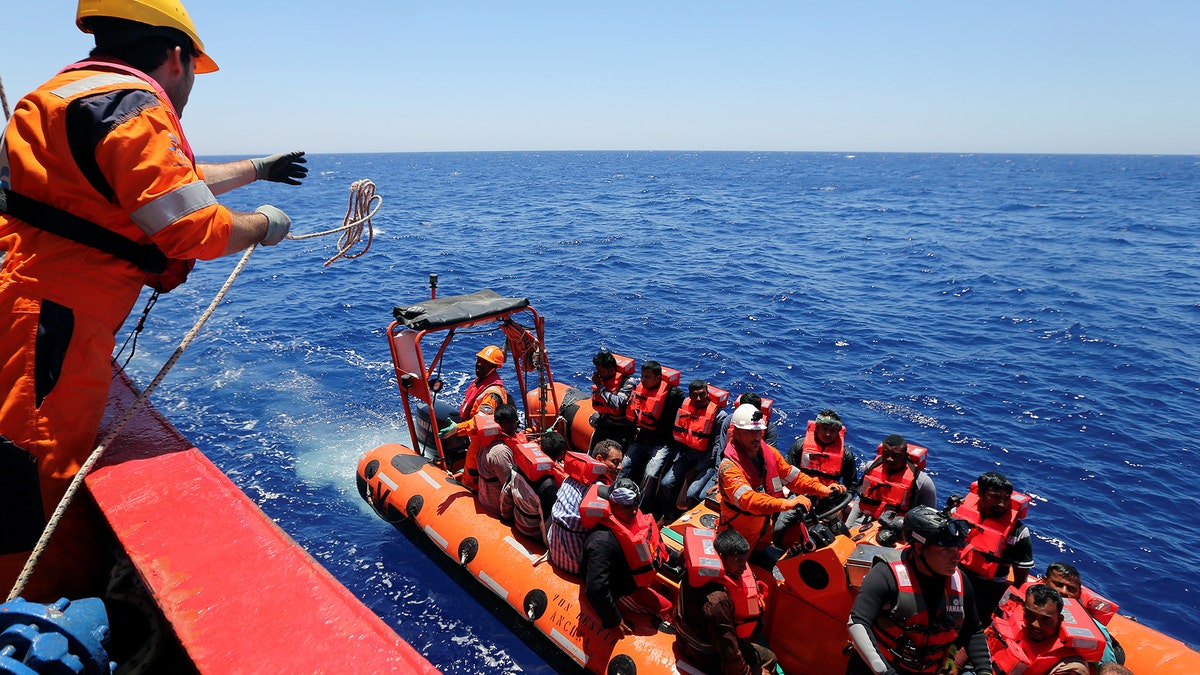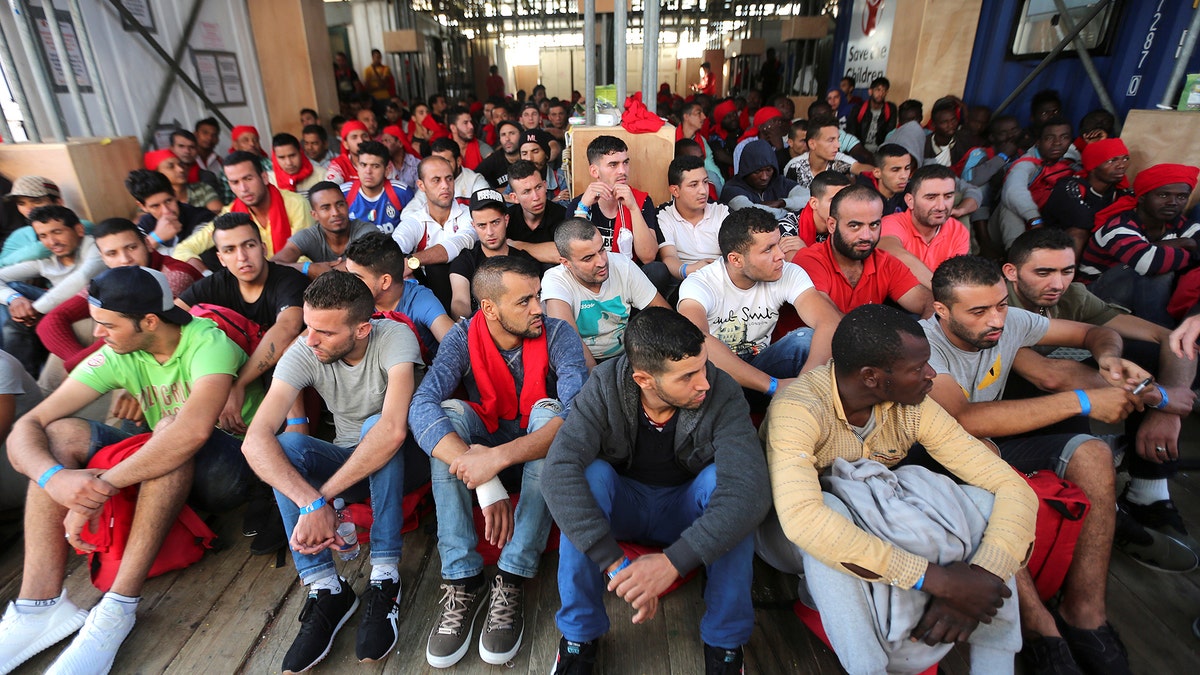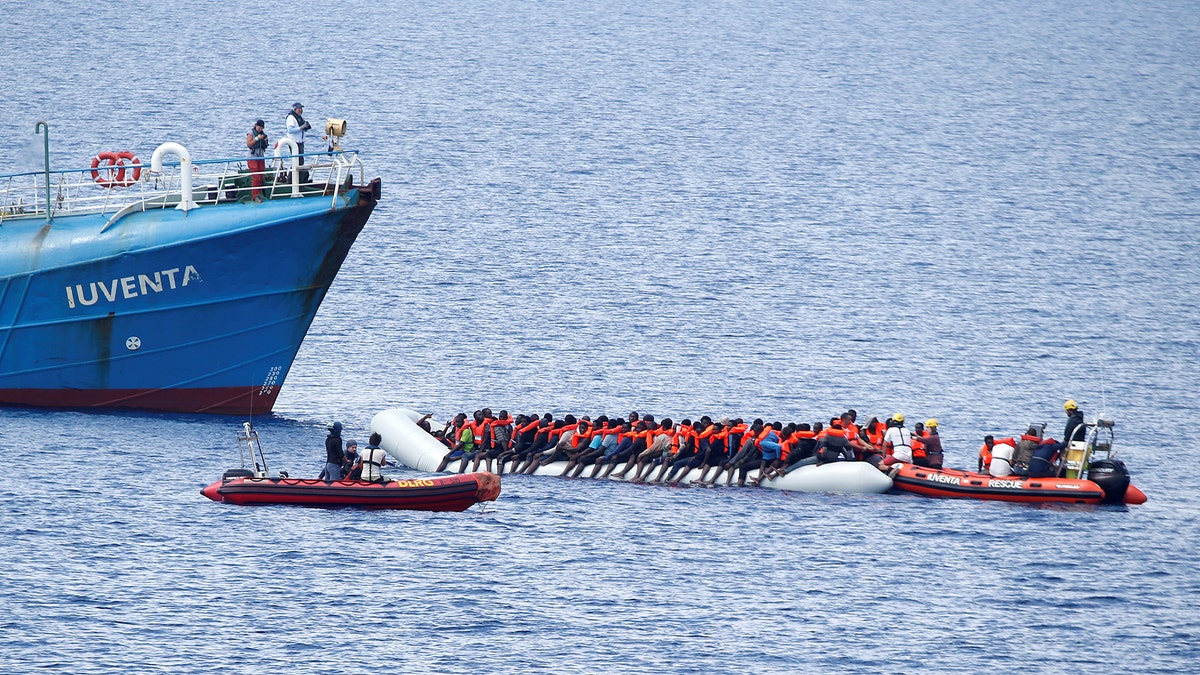
Migrants are rescued by "Save the Children" NGO crew from the ship Vos Hestia in the Mediterranean sea off Libya coast, June 15, 2017. REUTERS/Stefano Rellandini - RTS1792D
MILAN – Italy can’t build a wall, nor does it want to, but the debate over how to slow the flows of refugees and migrants here is reaching a fever pitch.
The problems of where to house them, and how to employ them, have not been solved. About 614,000 have arrived in Italy from North Africa since 2014. Italy accuses the rest of Europe of not helping to spread the burden.
One solution, agreed between Italy and the UN-backed Libyan government, is to send Italian ships to keep the traffickers’ boats from setting out toward Italy in the first place. This would potentially discourage people traveling to Libya from various African countries and devastate the traffickers. Those journeys are fraught with violence and risk. And that is before the risky sail from Libya.
ITALY PM: FEARS FOR MIGRANTS IN LIBYA RESOLVABLE
But given that the situation in Libya is fragile, this plan’s future may be tenuous, even dangerous. Libya has two competing governments now, and the one that is not UN-backed doesn’t want Italian ships in its waters—it has even accused beleaguered Italy of being the exporter of trouble.
Abdullah Bilhaq, spokesman for the Libyan House of Representatives in Tobruk, the alternate government, said last week: “The Libyan House of Representatives warns against the Italian state’s attempt to export illegal migration from its territory to Libyan territory by returning tens of thousands of illegal immigrants to Libyan territory.”
One top general with the opposing Tobruk government in Libya has hinted the Italian ships off its waters could provoke an attack by Libyan forces.
EUROPEANS VOW MORE HELP TO STEM LIBYA-ITALY MIGRANT FLOW
But there are even rifts within the Italian government about the justice in returning migrants to Libya, a place where they have suffered abuse and violence at the hands of the traffickers and a network of thugs who prey on the vulnerable.

About 614,000 have arrived in Italy from North Africa since 2014. Italy accuses the rest of Europe of not helping to spread the burden. (Reuters)
A junior government minister in Italy over the weekend suggested “making those people go back means condemning them to an inferno.”
In the meantime, suddenly, the Libyans themselves—the coast guard—have started turning migrants back, to the tune of around 800 over the weekend. All of these strategies and debates may have led to what amounts to a major reduction in arrivals in Italy for July when compared to July last year.
Still, the numbers overall for the year are almost on par with the figures for 2016. And this, experts say, is no longer tenable for Italy.
RIGHTS GROUP WARNS OF BIND FOR MIGRANTS AS EU LOOKS TO LIBYA
Another measure Italy has turned to is squeezing the NGO’s who rescue one third of the people saved at sea. For some time, the government has suspected that some of these organizations have been working hand in hand with the traffickers—not for any monetary benefits or insidious reasons—but to scoop up those taking off from Libya before they fall into distress.
The Italian government now says this is frankly a pull for the migrants and arrested an aid ship last week, in Lampedusa, that was carrying migrants. The ship was operated by the German agency Jugend Rettet, and reportedly Italian investigators picked up recordings of communications between traffickers and rescuers—making the scenario look like a convenient, almost staged, hand-off for the smugglers.
Doctors Without Borders has also been accused, as the anti-establishment Five Star Movement here would say, of running “sea taxis.” The group issued a statement denying that was the case.

Migrants on a dinghy are rescued by German NGO Jugend Rettet ship "Juventa" crew in the Mediterranean sea, off the coast of Libya June 18, 2017. Italy accuses the NGO of working in cahoots with traffickers. (Reuters)
“We hope any doubts can be dispelled soon to end this trickling of accusations that poisons the atmosphere in an ever gloomier situation,” the group said.
The government is demanding NGO’s sign a code of conduct if they want to bring rescued migrants to its ports, but many have said that goes against their principles of simply saving lives. But Italy said freely taking them to Italy is not helping the country.
"Because migrants arrive in Italy, we must find a balance between their rights and those of the country that hosts them,” Interior Minister Marco Minniti, said in an interview over the weekend. “We need complete trust between those who carry out the rescues and the country that opens up its ports."




















